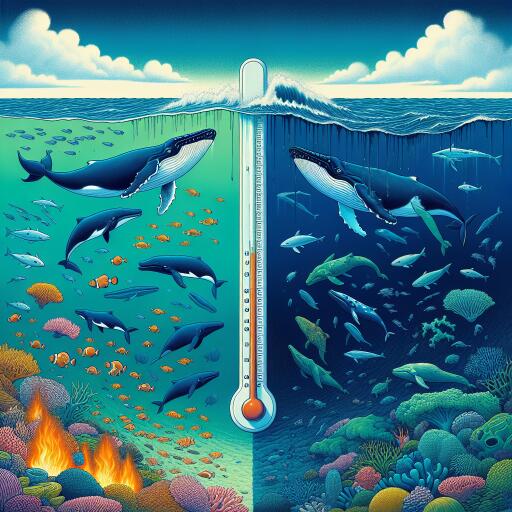
Heatwaves may be driving whale decline in Pacific: Study
In recent findings that raise concern for the future of marine life, a significant decrease in the population of North Pacific humpback whales has been observed, with a fall of 20 percent in under ten years. This unexpected decline, highlighted in a study released in late February, points towards marine heatwaves as a possible driving factor behind this troubling trend.
Efforts in conservation and the discontinuation of commercial whaling in 1976 had previously led to a steady resurgence in the population of these magnificent sea creatures up until 2012. However, over the past decade, researchers have witnessed a concerning downturn in their numbers.
A collaborative effort by a contingent of 75 scientists resulted in the development of an unprecedented photo-identification dataset for a large marine mammal, tracking the population dynamics of the North Pacific humpback whales from 2002 to 2021. This meticulous process, involving the capture of images of over 33,000 individual whales identifiable by their unique tail markings, accounted for approximately 200,000 sightings.
The initial hypothesis suggested that the whale population would reach a plateau at their natural “carrying capacity,” which is essentially the maximum number of individuals an environment can sustain. Contrary to these assumptions, the data revealed a sharp decline in population numbers. From a pool of roughly 33,000 individuals noted in 2012, the population had dwindled to just over 26,600 by 2021—a reduction of 20 percent. Within this broad dataset, whales that migrate to Hawaii for the winter exhibited an even more dramatic decline of 34 percent.
This drop in populations coincided with the occurrence of the most potent and enduring marine heatwave ever recorded between 2014 and 2016, which wreaked havoc on the northeastern Pacific. The extreme temperature anomalies, at times surpassing three to six degrees Celsius, drastically altered the marine ecosystem, impacting the availability of prey for the humpback whales.
The correlation between the marine heatwave and the decline in humpback whale populations is stark, suggesting that approximately 7,000 whales could have succumbed, primarily due to starvation. While fluctuations within wildlife populations are a normal part of their ecological dynamics, the abrupt and significant decline observed in a species known for its longevity indicates a major disruption that warrants further investigation and immediate action.
The findings underscore the intricate connections within marine ecosystems and the profound impact climate-related changes can have on marine species. As researchers delve deeper into the consequences of marine heatwaves, this study serves as a crucial call to action, highlighting the need for continued and enhanced efforts in marine conservation and climate change mitigation to safeguard the future of our planet’s majestic sea mammals.





Leave a Reply